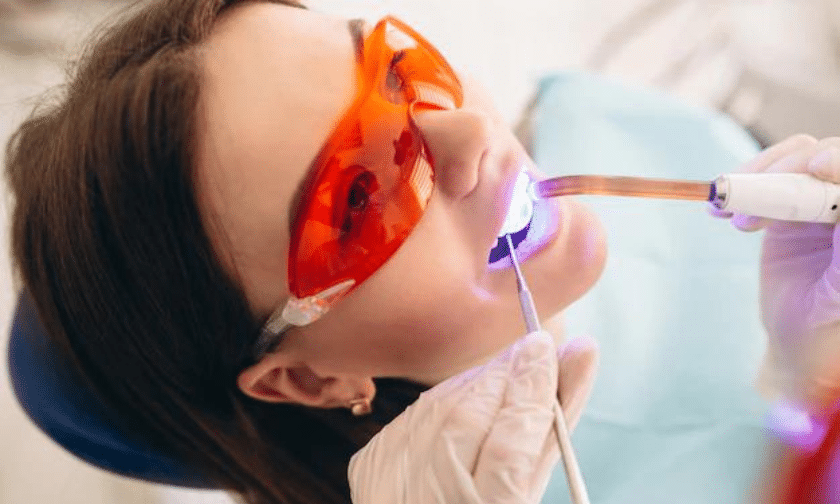A bright, white smile can boost your confidence and make a positive first impression. No wonder teeth whitening has become one of the most popular cosmetic dentistry procedures. But with so many options available, from professional in-office treatments to over-the-counter whitening strips, you might be wondering: is it safe to whiten teeth at home?
The answer, like most things in life, is “it depends.” Here’s a breakdown of the different at-home teeth whitening methods, their effectiveness, and safety considerations:
Useful Teeth Whitening Products
Drugstores and online retailers offer a wide variety of at-home teeth whitening products, including:
1. Whitening Strips: These thin, flexible strips coated with a low concentration of hydrogen peroxide (the bleaching agent that whitens teeth) adhere to your teeth for a set amount of time each day. They’re relatively easy to use and show noticeable results within a few weeks.
2. Whitening Toothpaste: These kinds of toothpaste contain mild abrasives and sometimes low levels of hydrogen peroxide to remove surface stains and brighten teeth slightly. They’re a good option for maintaining a whiter smile after professional whitening or for those with sensitive teeth who can’t tolerate stronger options.
3. Whitening Gels and Rinses: These products typically contain hydrogen peroxide or carbamide peroxide (another bleaching agent) in a gel or rinse form. They can be applied with a brush or tray and offer moderate whitening results.
Safety Considerations:
While generally safe for most people, over-the-counter teeth whitening products can cause some side effects, such as:
- Tooth Sensitivity: The bleaching agents can irritate gums and teeth, leading to temporary discomfort, especially with prolonged use.
- Gum Irritation: Harsh abrasives or improper application can inflame gums.
- Uneven Whitening: If not applied correctly, these products may whiten teeth unevenly.
Effectiveness:
Over-the-counter products offer a more affordable and convenient alternative to professional teeth whitening. However, their results are usually:
- Gradual: It takes longer to see noticeable whitening compared to professional treatments.
- Less Dramatic: The whitening power is milder, so the overall results may be less dramatic.
Natural Teeth Whitening Methods
Many natural remedies are touted for whitening teeth at home, including:
1. Baking Soda: A mild abrasive, baking soda can help remove surface stains. However, it can be too harsh for long-term use and may damage tooth enamel.
2. Strawberries: The malic acid in strawberries might offer slight bleaching, but the sugar content can outweigh any benefits and contribute to cavities.
3. Hydrogen Peroxide: While a diluted solution can be used for occasional whitening, overuse can irritate gums and teeth.
Safety Considerations:
Natural methods often lack scientific backing for their effectiveness and can be risky:
- Ineffective: Many lack the power to achieve significant whitening.
- Enamel Erosion: Abrasive ingredients like baking soda can wear down tooth enamel, the protective outer layer of your teeth.
- Increased Sensitivity: Natural acids like those in fruits can increase tooth sensitivity.
Effectiveness:
Natural methods are generally considered:
- Ineffective: There’s little scientific evidence to support their long-term whitening benefits.
- Potentially Damaging: Some methods can damage tooth enamel.
The Safest Option for Teeth Whitening
For the safest and most effective teeth whitening results, consider consulting a dentist. Here are some benefits:
1. Professional Supervision: A cosmetic dentist in Twin Falls can assess your oral health and recommend the best whitening method for your specific needs and sensitivity.
2. Stronger Products: Dentists can use higher concentrations of bleaching agents for faster and more dramatic results.
3. Custom-Fitted Trays: These trays ensure even application of the whitening product and minimize contact with gums.
Safety and Effectiveness:
Professional teeth whitening treatments are generally:
- Safer: A dentist can monitor the process and adjust it if needed to minimize side effects.
- More Effective: Professional treatments offer stronger whitening power for faster and more dramatic results.
Ultimately, the choice between at-home and professional teeth whitening depends on your budget, desired results, and sensitivity level. Consulting a dentist is always the safest option to ensure a bright, healthy smile that lasts. They can create a personalized plan that addresses your specific needs and concerns.
By understanding the pros and cons of at-home and professional teeth whitening, you can make an informed decision and achieve a radiant smile you can be proud of. Remember, a healthy smile is a happy smile, so prioritize both when choosing your whitening method.

